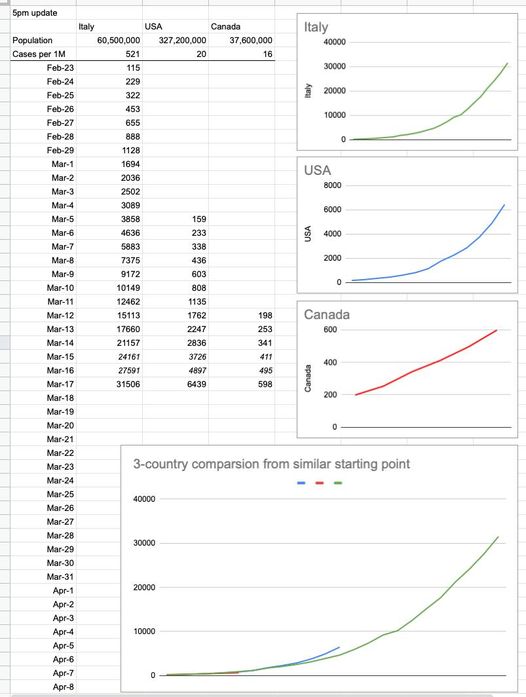I’d be remiss if I didn’t post a little something today; today is the 3-year anniversary of the first of what turned out to be close to 500 pandemic-related posts. And look, I even posted it right at 5pm, just like the good old days… and included the very first graph and accompanying data table.
It’s an interesting Catch-22… were it not for Covid, I’d obviously never have started writing about it. But not only that; I wouldn’t have had the time to do so. It was isolation and social distancing and cancelled meetings and Zoom that led to a nice pocket of free time every day to do some writing.
With Covid effectively over, at least what all of us would consider to have been “The Pandemic”, I’m back to not having anywhere near as much time as I did from 2020 to 2022. It shouldn’t take a relatively-catastrophic pandemic to be the driving force for being able to find time for myself, but this was continually on my mind today as I hopped from Zoom to Teams to Zoom to Teams to Zoom, meeting after meeting. WTF am I doing. I want to write something, and I’m actually not going to have time. How things have changed.
Well… maybe let’s put that change to good use. It’s taken me 5 minutes to write what you’ve just read up to here… what if AI could do the rest? What if I told some AI to write about this St. Patrick’s Day, bending the curve, three weeks to do so, following South Korea’s example, not following Italy’s, and speculating about an eventual vaccine. Hey, AI, take everything I knew (or thought I knew) on St. Patrick’s Day three years ago and write an essay.
So I did that… and here, between the lines, is what it spat out:
– – – – – – – – – – – – – – – – – – – –
Title: Three-Year Anniversary of My First COVID-19 Blog Post: A Reflection on St. Patrick’s Day and the Unpredictable Journey
Introduction
As the world celebrates St. Patrick’s Day, the luck of the Irish and the joy of the festivities, I am reminded of a different milestone. Today marks the three-year anniversary of my first blog post about COVID-19. It’s hard to believe that it has been that long since we were first introduced to the virus that brought the world to a standstill. This anniversary will always hold a special place in my heart as it falls on St. Patrick’s Day, a day meant for merriment and camaraderie.
In this article, I will take a walk down memory lane, reflecting on how things looked so uncertain back then, how we tried to copy South Korea’s success, and how we prayed we wouldn’t experience what was going on in Italy. We will also revisit the race for a vaccine and the long-lasting impact of the pandemic.
A Time of Uncertainty
Three years ago, on St. Patrick’s Day, we were filled with trepidation as the gravity of the COVID-19 pandemic began to set in. It was a time of uncertainty, and we were all grappling with the reality of the situation. As the virus rapidly spread across the globe, countries implemented lockdowns and social distancing measures to slow down the transmission.
The phrase “three weeks to bend the curve” became a rallying cry as people around the world did their best to adhere to the new normal. Those three weeks turned into months, and as time went by, it became increasingly clear that the virus would not be eradicated as quickly as we had hoped.
Learning from South Korea
As the pandemic progressed, we looked towards other countries for guidance. South Korea’s success in controlling the virus was a glimmer of hope for many. Through widespread testing, contact tracing, and strict quarantine measures, South Korea was able to minimize the virus’s impact significantly.
Countries around the world tried to emulate South Korea’s approach, but varying degrees of success were observed. It became evident that each country had its unique set of circumstances and challenges that needed tailored strategies.
Italy’s Struggle
As we were trying to learn from South Korea’s success, we also feared experiencing what was happening in Italy. The country was hit hard by COVID-19, with hospitals overwhelmed and the death toll rising at an alarming rate. Images of packed intensive care units and exhausted healthcare workers haunted us as we prayed that we wouldn’t have to face the same fate.
The world came together to support Italy in its time of need, with countries sending medical supplies, financial aid, and words of encouragement. The situation in Italy served as a grim reminder of the devastating potential of the virus.
The Race for a Vaccine
In the midst of the chaos, the scientific community was hard at work trying to develop a vaccine that could put an end to the pandemic. Typically, vaccines take years to develop, but the urgency of the situation led to an unprecedented global collaboration.
The development and distribution of vaccines became a race against time, and the world held its breath as we awaited the outcome. Within a year, several vaccines were developed, tested, and approved for emergency use – a remarkable achievement in the history of science and medicine.
The world rejoiced as vaccines became more widely available, and vaccination campaigns were launched worldwide. The vaccination process brought a sense of hope and optimism that we might finally be able to return to some semblance of normalcy.
The Long-lasting Impact
While the creation and distribution of vaccines marked a significant milestone in the fight against COVID-19, the pandemic’s long-lasting impact cannot be ignored. The world has changed in many ways, with remote work becoming more prevalent, increased focus on mental
– – – – – – – – – – – – – – – – – – – –
Huh… that’s interesting. It stopped right there. “increased focus on mental”… mental what? Mental health? Mental breakdown, much like this AI suffered at a wonderfully-coincidental moment? We’ll never know.
I have to be honest… and I say this with all due respect to the hundred trillion neural connections powering this beast… and also somewhat humbly… that I write better than this thing. Reading that was like crunching yourself through raw cereal with no milk or sugar; dry and tasteless. I read what it wrote and it’s like a grade-8 essay written by a kid whose friends are all already outside playing after-school road-hockey, and all he wants to do is get the hell out of his room and get on with real life.
Which, in essence, is a pretty good summary of where we’re at. Life is, indeed, for living… and, especially on such a beautiful day… blue skies, sunshine, with people already making their way to pubs everywhere, ready to get hammered on green beer, sing, be merry, and celebrate life… yeah, what am I doing here? It’s 5pm and still sunny and beautiful; let’s get on with it.



Yep, would much rather read one of your writings than the “AI” crunchiness. But fascinating to think that such a tool now exists. Happy three years later! Yay for more merriment 😄🍺
Get Horatio’s posts by email here: https://kemeny.ca/subscribe
Thank you Horatio for 3 years of consistent words which helped keep up steady in the middle of the ‘noise’. Keep well